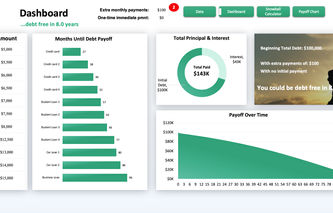We often hear about millionaires that can live off interest and dividends during retirement. But what about a billion dollars? And what is the interest on a billion dollars? Is the amount really as obscene as it sounds?
(Spoiler alert—it is.)Let's see what it would be like to have a billion dollars.
If you like this article, check out the interest earnings within the posts listed below:
And take a serious look at our Best Investment Apps and Best Stock Apps if you're looking to invest.
Can you live off a billion dollars?
The question that's circling the internet right now is, "Can you live off a billion dollars?" You certainly can. I'm sure you could find plenty of uses for a billion dollars. And—honestly—a billion dollars could take care of you and the next four or five generations after you (with money to spare).
What could you spend a billion dollars on?
Besides your regular cost of living, healthcare, and so on, you could also—
Buy a $100,000+ watch that takes six months to make.
Get yourself a private jet for $44 million.
Become the owner of California's most expensive home for $160 million.
Donate $25 million to end homelessness in Texas.
And that's just a start. There is so much you could do with $1,000,000,000 dollars. And, as you can see, all of the above payments still wouldn't get you close to spending a billion dollars.
(Interested in becoming wealthy yourself? The year 2023 was a good one for Yieldstreet and Crowdstreet for passive income. Here's our Crowdstreet review if you're interested.)
How long would it take to spend 1 billion dollars?
Based on the above, you can see buying even the most beautiful audacious thing still doesn't cost a billion dollars.
So what would it take to clear away all that cash? How long would it take to spend it?
Let's say you decided to spend $10,000 a day for the rest of your life. How long could you live on 1 billion dollars before you ran out of money?
By spending $10,000 a day, you would go through $3,650,000 a year. Even if you earned no interest on your billion dollars and spent $10,000 every single day of your life, you could still live for 270 years on 1 billion dollars.
In other words, you'd never run out of money.
What do billionaires invest in?
Billionaires don't often put their money in index funds and step away. They like to make things a bit more interesting.
Instead of dull slow-growing investments, they might invest in real estate, art, or collectibles. One of the top platforms right now is Yieldstreet. (It's a bit exclusive though—I believe you need to earn over $200,000 a year to qualify.)
What about a million? Can I retire with a million dollars?
Okay, maybe the billion dollar goal isn't quite right for you. The second question many are asking (once they realize they'll never earn a billion dollars) is, "Can I retire with a million dollars?".
The answer is—yes, you can.
Just because you're not a billionaire doesn't mean you can't retire and live comfortably. Many people retire with a million (or less) and are able to keep up with their current lifestyle. The key is to be able to spend your money wisely and not let "lifestyle creep" start to affect you.
Do billionaires have billions in cash?
The term billionaire means—
An individual with assets or a net worth of at least one billion currency units such as dollars, euros, or pounds.
In other words, billionaires don't have billions of dollars in cash.
You don't need a billion dollars in cash, just a billion dollars in assets (real estate, land, businesses, money market accounts, and the like).
What is the annual interest on a billion dollars?
What would be the interest on 1 billion dollars per year?
Based on some research, here's what the average interest rates usually look like:
Savings: 1%
Short term government bond: 1%
Short term corporate bond: 2-3%
Annuity: 3%
Certificate of Deposit: 5%
Real Estate: 7%
S&P 500 Index Fund: 10%
Those are the interest percentages, but what does that mean in terms of dollars?
What is the interest on 1 billion dollars per year?
So what is the income on $1 billion dollars per year?
With 1% interest, you'd make $10 million a year. (That's just for the money to sit there and collect.)
At 3% interest, you'd earn $30 million per year.
At the annual rate of return of 8%, that's $80 million a year.
What is the interest on 1 billion dollars per day?
If you had a billion dollars and invested it, what would the interest be on 1 billion dollars per day?If you invested a billion dollars with the interest rates below, here's how much you would earn each day:
1% interest = $27,397 per day.
3% interest = $82,191 per day.
8% interest = $219,176 a day.
If you had a billion dollars, you could earn more in a day than most people do in an entire year.
What is the interest on 2 billion dollars?
How about the interest on 2 billion dollars? Well, you would just double what we discovered above—
At 1% interest, you'd earn $20 million a year.
With 3% interest, you'd earn $60 million per year.
At 8%, that's $160 million a year.
How to Earn $1 Billion Dollars
Alright, so how do people do it? How on earth do they earn $1,000,000,000 dollars?
People earn $1 billion one of two ways:
They build a business that becomes insanely successful.
They inherit the money from their business building parent.
That's really it. You're not going to earn a billion dollars by investing $1,000 a month into mutual funds. It's just not going to happen. If you want to be a billionaire, you're going to have to start a business, work your butt off, and constantly re-invest the majority of the profits back into it.
How Long Would It Take to Make 1 Billion Dollars?
Let's talk about how long it would take to make $1,000,000,000 dollars in the first place. Unfortunately, most people—no matter how hard they work—will never earn a billion dollars in their lifetime.
Let's put earning a billion dollars into perspective here—
If you made minimum wage your entire life, it would take you 69,000 years to make $1 billion dollars.
If you earned the average American income, or $50,000 a year, it would take you 19,000 years.
Even if you made mid-six-figures (say, $500,000) a year, it would take you 2,000 years to earn 1 billion dollars.
The only way to truly earn a billion—without interest or inheriting any money—would be to earn $20 million dollars a year. Even then, it would still take you fifty years to earn $1,000,000,000.
How Long Would It Take You to Earn 1 Billion Dollars With Investing?
As Einstein (supposedly) once said, "compounding interest is the eighth wonder of the world". So, what if you consistently invested a fair amount of money? How long would it take to make 1 billion dollars with investing?
Let's say you could invest $2,000 a month starting at age 16.
And, let's assume that you average a 10% return on your investments every year.
If you invested $2,000 every single month, never spent a dime, and always earned 10% a year, you'd become a billionaire on your 100th birthday.
In the above scenario, it would take you 84 years to become a billionaire via simple investing.
That's actually not too bad. Sure, you'd never get to enjoy your money, but you'd leave a tremendous amount of wealth to your family.
Investing a Billion Dollars—Where Do Billionaires Put Their Money?
As we said before, most billionaires are businesspeople.
They work tirelessly. They love what they do. They simply live and breathe their businesses. It should come as no surprise that much of these individuals' wealth is tied up in those ventures.
Where do billionaires invest? In themselves and in their businesses.
Take, for example, Jeff Bezos—
Where is Jeff Bezos's money stored?
Around 90% of Jeff Bezos's fortune is in Amazon stock holdings. And, as we already said above, the same goes for most of America's wealthiest individuals.
But why? The answer is quite simple.
If they cashed in on their holdings, that would make their wealth "realized" and they'd be taxed on their gains. As long as they leave their wealth in the value of their business—they aren't.
So if you don't need the money, why take it out and pay taxes on it? You may as well just be a well-known billionaire and enjoy the fame while it lasts.
Other Questions People Ask When Thinking About Billions of Dollars
Most questions about billions of dollars revolve around saving up millions—which is totally fine. Saving up a couple million does the job quite nicely.
What is the yearly interest on 2 million dollars?
Considering that many millionaires reach $1–2 million before retirement, you may be wondering how much you could earn on your money.
The yearly interest on $2,000,000 would be $160,000 a year (when assuming an 8% earnings rate).
That could easily be money to live on year after year.
What is the interest on 10 million dollars?
Now, with $10 million dollars, you obviously won't earn as much in interest as you would with a billion.
The average 8% annual interest on 10 million dollars would result in about $800,000 a year.
That's still more than what many people will save in a lifetime though, so it could be worse.
How many bank accounts should I have when building wealth?
Now that you know about interest and how much you could make with both a billion and a million or two, let's talk about bank accounts.
Experts say that you should have at least four bank accounts. These will be for budgeting, saving, and building wealth through investing.
How would this work for the average person?
You'll need two different checking accounts:
One would be for your regular bills—including your mortgage or rent, utilities, and other bills you can't escape from (like groceries).
The second one would be for spending money or personal money. (So this is money you can spend guilt-free.)
Then, you'll need two savings accounts:
The first would be for your emergency fund. This account should be harder to touch so you aren't tempted to dip into it unless you absolutely have to.
The second savings account should house your other savings goals. These include saving for a house, a car, and more.
Should I keep all my money in one bank?
What about using multiple banks? You've heard that some wealthy people use more than one bank to house their money. Should you keep all your money in one bank? Or split it up?
That depends.
If you have more than $250,000, it's recommended to split it up.
This helps ensure that you have full FDIC insurance coverage in case your bank fails.
Where do millionaires keep their money?
Forget billionaires for a second. Where exactly are millionaires keeping their money?
Considering the fact that FDIC insured banks only insure $250,000 each person, they have to keep the rest somewhere, right?
Well, that would be correct. Millionaires put their money in many different places and assets. These include—
Real estate
Stocks
Mutual funds
Other accounts
It's important to keep your hard-earned money safe. If you're thinking about storing your millions, talk to a tax professional or a financial advisor.
What Is The Interest on a Billion Dollars? Summing It Up
As you can see, the interest on a billion dollars is more than what most people could spend their entire lives.
If you'd earn just 1% on a billion dollars, you'd make $10 million a year. That's pretty astonishing.
Chances are, you're not going to be a billionaire—but even if you save up just one million bucks, that's still a heck of a lot better than nothing. And, you could still live a very fulfilling, happy life.
So, what about you? Do you think you'll be living off the interest of a billion dollars? Or something less?



.jpg)



